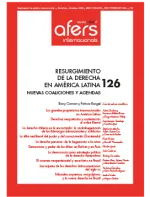Networks of power: insights into Guatemala’s neoliberal power and knowledge elite

Karin Fischer, profesora asociada, Instituto de Sociología, Universidad Johannes Kepler Linz, Austria. ORCID: https://orcid.org/0000-0002-9307-3051
Harald Waxenecker, investigador, Departamento de Estudios Ambientales, Facultad de Estudios Sociales, Universidad Masaryk, República Checa. ORCID: https://orcid.org/0000-0002-8361-2760
Taking Guatemala as a case study, this paper reflects on the neoliberal power and knowledge elite. Based on Michael Mann’s theory of social power and research on power structure, as well as network analysis, the study explores Guatemala’s domestic network of right-wing/neoliberal think tanks and detects the key links and core nuclei within it. Using real data, the analysis reveals the business connections between the staff of these neoliberal think tanks. The paper is thus the first reflection on those in privileged positions of power within the think tank network and the capacity this gives them to establish contacts and transfer knowledge to the fields of economic and ideological power.
Keywords: neoliberalism, think tanks, Guatemala, power and knowledge elite
DOI: doi.org/10.24241/rcai.2020.126.3.89
How to cite this article: Fischer, Karin y Waxenecker, Harald. «Redes de poder: consideraciones sobre la élite neoliberal de poder y conocimiento en Guatemala». Revista CIDOB d’Afers Internacionals, n.º 126 (diciembre de 2020), p. 89-115. DOI: https://doi.org/10.24241/rcai.2020.126.3.89
>> The full text articles of this issue are available only in Spanish language